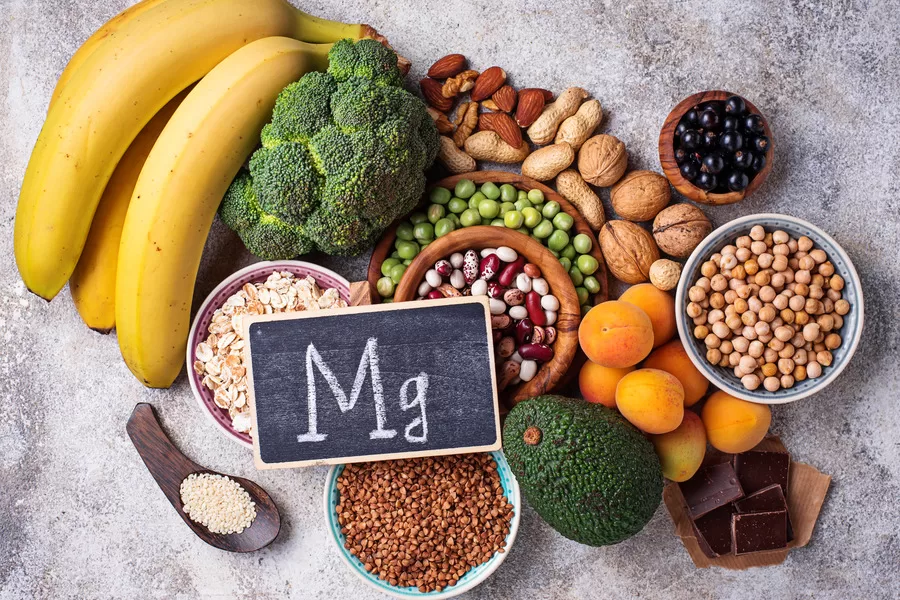
Picture a single, mighty nutrient capable of juggling multiple health tasks – from fortifying muscles and bones to soothing your mind and boosting your energy levels. Magnesium stands tall, orchestrating over 300 essential bodily reactions. It’s the architect behind energy generation, protein formation, and much more, making it an indispensable ally for your well-being.
Beyond its impressive resume, magnesium emerges as a beacon of calm and resilience, offering a shield against the daily stresses of life and enhancing quality sleep. Its pivotal role in maintaining optimal testosterone levels further cements its status as a cornerstone of both physical and sexual health. Integrating more magnesium into your life could be the game-changer you’ve been searching for.
Magnesium
This mineral multitasks tirelessly, from crafting the very proteins that form the fabric of our being to ensuring our nervous system communicates without a hitch. It guarantees the rhythmic dance of muscle contractions and relaxations, while also diligently watching over our blood sugar and pressure levels, maintaining them within healthy bounds.
Architect of Bone Strength and Genetic Blueprints
Magnesium’s contribution to bone integrity is paramount, standing shoulder to shoulder with calcium in importance. Its involvement in DNA and RNA production is equally critical, laying down the genetic groundwork that guides cell behavior and health. Moreover, magnesium’s role in the generation of glutathione—a formidable antioxidant—reinforces its status as a cellular protector, safeguarding our cells against environmental and metabolic onslaughts.
Fueling Our Bodies with Magnesium’s Riches
Our reliance on dietary sources for magnesium underscores the mineral’s significance, as our bodies lack the capability to produce it independently. Abundantly present in nuts, seeds, grains, greens, and legumes, magnesium stands ready to nourish us, yet many fall short of achieving their daily magnesium quota. Actively seeking out these magnesium-laden foods is vital for bridging this nutritional gap and ensuring our physiological machinery operates without a glitch.
Alleviating Stress with Magnesium’s Calming Influence
The prowess of magnesium extends to tempering the body’s stress response. It adeptly moderates neurotransmitter activities, smoothing over our reactions to stress and imbuing us with tranquility. This mineral is also key in converting our dietary intake into usable energy, invigorating our days and enhancing our vitality.
Magnesium and Testosterone: Unveiling the Synergy
As we delve deeper into the realm of nutritional science, the synergistic relationship between magnesium intake and testosterone levels emerges as a focal point of interest. This powerful duo is instrumental in enhancing muscular fortitude, bone resilience, and sexual vitality. The intricate dance between dietary choices, physical activity, quality rest, and specifically, magnesium consumption, is crucial for the fine-tuning of testosterone balance.
Orchestrating Hormonal Harmony: Magnesium’s Role
Within the vast network of hormonal interactions, magnesium commands a special role, orchestrating a state of equilibrium. By buffering the nervous system and curtailing the surge of cortisol—a hormone that can overshadow testosterone—magnesium ensures a stable hormonal milieu conducive to testosterone preservation.
Magnesium’s Testosterone Elevating Effect
The frontier of scientific exploration reveals the impactful role magnesium plays in bolstering testosterone levels, an effect that shines in conjunction with physical activity. Research underscores the testosterone-boosting benefits for those enriching their diet with magnesium, a phenomenon that is accentuated by an active lifestyle. This discovery highlights a natural pathway to testosterone optimization through magnesium enrichment and physical engagement.
Reaping Testosterone’s Benefits
The essence of testosterone spans beyond mere physical prowess, touching upon the foundations of bone health, sexual function, and psychological equilibrium. Facing the inevitability of testosterone’s natural decline with age, magnesium stands out as a strategic nutrient capable of curtailing this descent, thus fostering an enduring vibrancy and vitality.
Embracing a magnesium-rich diet, characterized by the inclusion of verdant greens, seeds, nuts, and whole cereals, or considering magnesium supplements, represents a forward-thinking strategy to enhance hormonal health. This dietary philosophy not only aims to stabilize testosterone levels but also to uplift overall wellness, spotlighting the critical role of magnesium in our nutritional landscape.
Raising Your Magnesium Game: Creative Dietary Tweaks
Nutty Nuggets & Seed Sprinkles
Transform your munching habits with nuts and seeds, the tiny titans of nutrition. Almonds and pumpkin seeds not only make for crunchy, satisfying snacks but also are magnesium marvels. Whether it’s a topping over your morning oatmeal or a crunchy addition to your salads, these little gems infuse meals with a nutritious, magnesium-rich crunch.
Grain Galore: The Magnesium Staples
Shift your grain game up a notch with magnesium-dense stars like brown rice and quinoa. These staples aren’t just about satiety; they’re a canvas for culinary creativity, adding depth to your dishes while packing a magnesium punch. Substituting refined grains with these wholesome alternatives can significantly perk up your meal’s nutrient profile.
Green Giants: Magnesium’s Vegetable Vanguard
Step into the green gallery of spinach, Swiss chard, and their leafy kin, where magnesium abounds in every bite. These green giants are versatile—blend them into smoothies, toss them into salads, or gently steam them to unlock their full nutrient potential. The deeper their green, the more magnesium they hide, making them indispensable in a health-conscious kitchen.
Legume League: The Flavorful Frontiers
Dive into the diverse world of legumes—beans, lentils, and beyond—for a flavorful magnesium boost. These culinary chameleons adapt to any dish, from simmering stews to refreshing bean salads, enriching your diet with both magnesium and a symphony of flavors. Embracing legumes is a step towards a heartier, healthier plate.
Infusing your diet with these magnesium-rich selections is more than a nutritional strategy; it’s a lifestyle shift towards heightened health and vitality. By integrating these food groups into your daily regimen, you’ll not only target specific health goals like enhanced testosterone but also embrace a broader spectrum of wellness benefits.
Magnesium Deficiency Signs
Detecting early warnings that your body isn’t getting enough of a vital mineral can be subtle. This element is indispensable for a myriad of physiological processes, from ensuring smooth muscle and nerve operations to stabilizing heart rhythm and fueling our cells with energy. Insufficient levels lead to a variety of signals from our body, urging us to take action.
- Unexpected Muscle Reactions: Ever experienced a sudden jerk or a twitch in your muscles? This could be your body crying out for more essential nutrients. It’s critical for helping muscles relax after contraction, and a lack in your system might lead to these involuntary spasms.
- Persistent Weariness: Feeling drained for no apparent reason, despite resting well, could hint at this mineral’s deficiency. It plays a pivotal role in energizing our cells. Running low on it might leave you feeling constantly fatigued or sapped of energy.
- Quick to Frustrate: A short fuse or feeling unusually snappy can also be tied to not having enough of this essential element. It’s involved in brain functions that regulate our mood, meaning a shortfall could lead to irritability or fluctuations in your emotional state.
- Struggles with Slumber: Difficulties in catching some Z’s might also be a clue. This nutrient assists in calming the body and mind, facilitating easier sleep onset. If you’re finding it hard to drift off or stay asleep, your diet might be lacking in this key component.
Other Clues to Consider
Several other subtle signs could suggest your intake is insufficient. Issues like elevated blood pressure, heartbeat irregularities, and brittle bones also point towards this deficiency, as it’s essential for both cardiovascular and skeletal health. Encountering these symptoms could be a nudge to reevaluate your nutritional habits.
Recognizing these signs promptly can guide you to make necessary adjustments in your diet or contemplate supplementation. Enriching your meals with foods high in this indispensable mineral, such as green veggies, seeds, nuts, and grains, can markedly enhance your health. Always consult a healthcare expert before introducing supplements, especially if you’re already taking other medications.
Daily Magnesium Requirements
Knowing exactly how much of this vital mineral you need every day can help you plan your meals and supplements better. Your body’s requirements for magnesium can vary based on several factors, including your age, whether you’re male or female, and special conditions like pregnancy.
- For Adults: Men and women need different amounts of this mineral. Adult men should aim for about 400 to 420 milligrams (mg) per day. Women, on the other hand, should target around 310 to 320 mg daily. These amounts help ensure your body functions smoothly, supporting everything from muscle health to sleep.
- For Kids: Children’s needs vary greatly as they grow. For little ones under three, about 80 to 130 mg daily is sufficient. Kids between 4 to 8 years old need a bit more, around 130 to 240 mg. As they head into their teen years, from 9 to 13, the requirement jumps to about 240 to 360 mg daily, setting the stage for adult needs.
- During Pregnancy: Pregnancy increases the demand for this crucial nutrient, vital for supporting both the mother’s and baby’s health. Pregnant women should aim for about 350 to 360 mg daily. This boost helps support the development of the baby and can even make the pregnancy smoother for the mom.
For Athletes and Active Individuals
If you’re regularly hitting the gym or engaging in any form of strenuous physical activity, your body might need more of this mineral than the average person. While there’s no one-size-fits-all number, aiming slightly above the standard RDA can help compensate for the magnesium lost through sweat and physical exertion.
Meeting these daily goals can seem daunting, but with the right foods and, if necessary, supplements, it’s entirely achievable. Foods like almonds, spinach, and black beans are magnesium-rich and can easily help you reach your daily target. However, it’s always a good idea to talk to a nutritionist or healthcare provider before making significant changes to your diet or starting supplements, especially if you have underlying health conditions or are pregnant.
Conclusion
Central to orchestrating over 300 vital bodily processes, magnesium’s roles span from muscle and nerve function enhancement to heart rate regulation and energy mobilization. Its pivotal influence extends to stress reduction, sleep quality improvement, and the amplification of testosterone levels, significantly affecting both physical endurance and libido. Natural magnesium reserves are abundant in a variety of foods, including crunchy nuts, wholesome seeds, vibrant greens, and hearty whole grains, pivotal for meeting daily mineral quotas. Detecting a magnesium deficit is key, with telltale signs including spontaneous muscle contractions, unshakeable tiredness, emotional volatility, and restless nights. Comprehending one’s specific magnesium requirements, which fluctuate with life stages, gender distinctions, and special conditions such as pregnancy, is fundamental for nutritional planning.
FAQs
It’s instrumental in supporting more than 300 bodily reactions, such as enhancing muscle and nerve operations, regulating heartbeat, boosting energy levels, easing stress, and fostering restful sleep.
Indeed, elevating your intake has been linked to positive effects on testosterone, which can enhance physical stamina and libido through improved hormonal balance and stress management.
Nutrient-dense options include various nuts (like almonds), seeds (pumpkin and sesame), leafy veggies (spinach), and whole grains (quinoa and brown rice), all crucial for fulfilling your daily nutritional goals.
Common signs include involuntary muscle movements, persistent exhaustion, increased irritability, mood swings, and troubles with sleep patterns.
The amount needed varies, depending on life stage, gender, and specific conditions like pregnancy. Generally, adult males require 400-420 mg, females need 310-320 mg, and pregnant individuals may need 350-360 mg daily.







